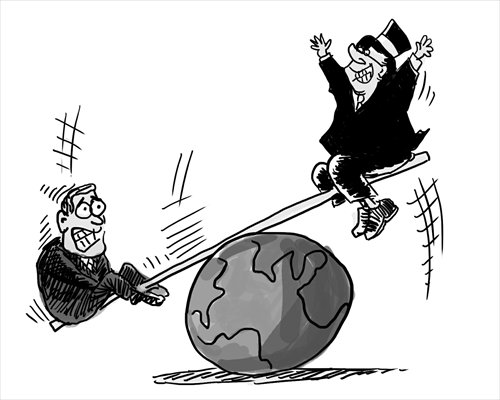HOME >> OP-ED
West's resurgence highlights Asia's changes
By Ding Gang Source:Global Times Published: 2014-1-1 23:53:01

Illustration: Liu Rui/GT
The New Year special edition of The Economist published an article titled "The West's turn." The data provided by the article shows that the developed economies such as the US, Japan, the UK and Germany will contribute more to global economic growth than emerging nations such as China, India, Russia and Brazil, and that the engine of the world's economy will shift to the West.This shift indicates that emerging countries, especially Asian ones that have always been relying on foreign trade, face the urgency of economic transformation.
Singaporean scholar Kishore Mahbubani predicted the two features of the shift of the global power years ago: "the end of the Western domination of world history (but not the end of the West) and the return of Asia."
This prediction came after the West's decline after the 2008 financial crisis. However, the sluggish export and stagnation of economic transformation that emerging economies have encountered in 2013 explicitly show the dark side of the shift and the toughness of reform.
Another difficulty is that the irreversibility of the power of Western civilization has been deep-rooted. Many emerging countries have been trying to find a way out by following the West's tracks, resulting in some small Asian countries finding it even harder to choose a neutral way to seek their own development.
A number of emerging Asian countries such as Thailand have witnessed serious political disturbances. Myanmar has been entangled in conflicts among different ethnic groups and religions. Turkey's political crisis can be attributed to economic malaise. And Indonesia has suffered as severe impact from the global economic downturn due to its over-dependence on goods export.
The IMF and the World Bank offered no better solution other than deepening reform. But a more dangerous trend is that economic decline will constrain the momentum for reform. A country's wavering choice between authoritarianism and democracy can wreck hard-won achievements.
As the US has withdrawn troops from Iraq and will leave Afghanistan, isolationist sentiments within the country are becoming intense and its "pivot to Asia" strategy can only be carried out from a long distance.
The US will balance China's rise by making more use of its allies, which will lead to a new imbalance. Currently, Japan is using the US' strategy to try to break the postwar peace order and regain its status as a great political power. At the same time, China is facing the challenge of how to establish a security mechanism in which the country participates in rule-making and maintenance.
The stability of Asia, after all, depends on how stable each country's development is. In an era when the production chain has become more mature than ever, the key for reform in these emerging Asian countries is whether they can keep the trend of rising in the industrial chain and effectively share the achievements of globalization.
The year of 2014 is bound to be tough. The Financial Times ended 2013 with an editorial headlined "A tougher year for emerging markets," which asserts that "the outlook for the developing world largely hinges on what happens in China." Behind such claims is the high attention of the international community is paying to China's reform process.
Reform on China's political and economic governance is key to increase China's national strength in the future. It is also one of the decisive factors in the changing of the power pattern in Asia. The opportunities in a reform era are created by active reforms.
When scholars use the word "civilization" to describe the concept of global power shift, we should see the hardships and responsibilities embedded within it.
The author is a senior editor with People's Daily. He is now stationed in Brazil. dinggang@globaltimes.com.cn Follow him on Twitter at @dinggangchina
Posted in: Columnists, Ding Gang, Viewpoint